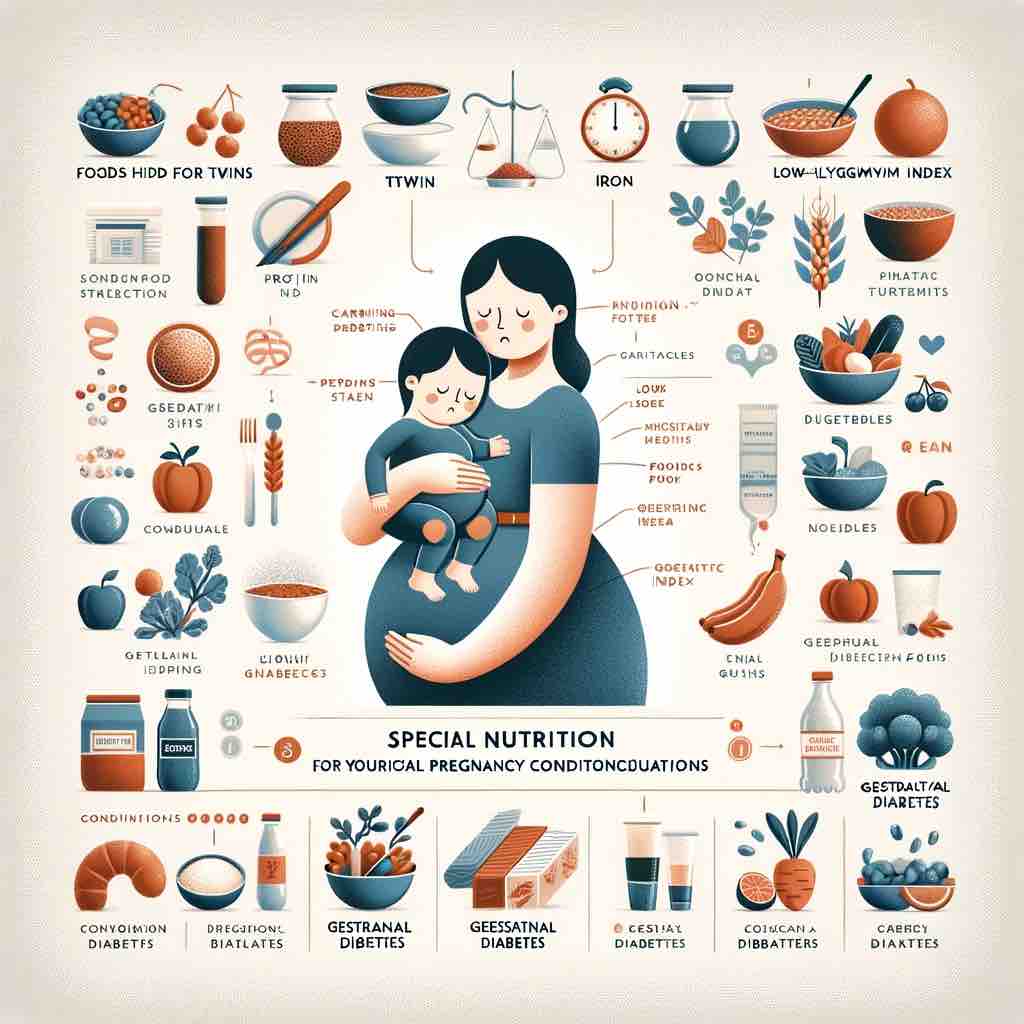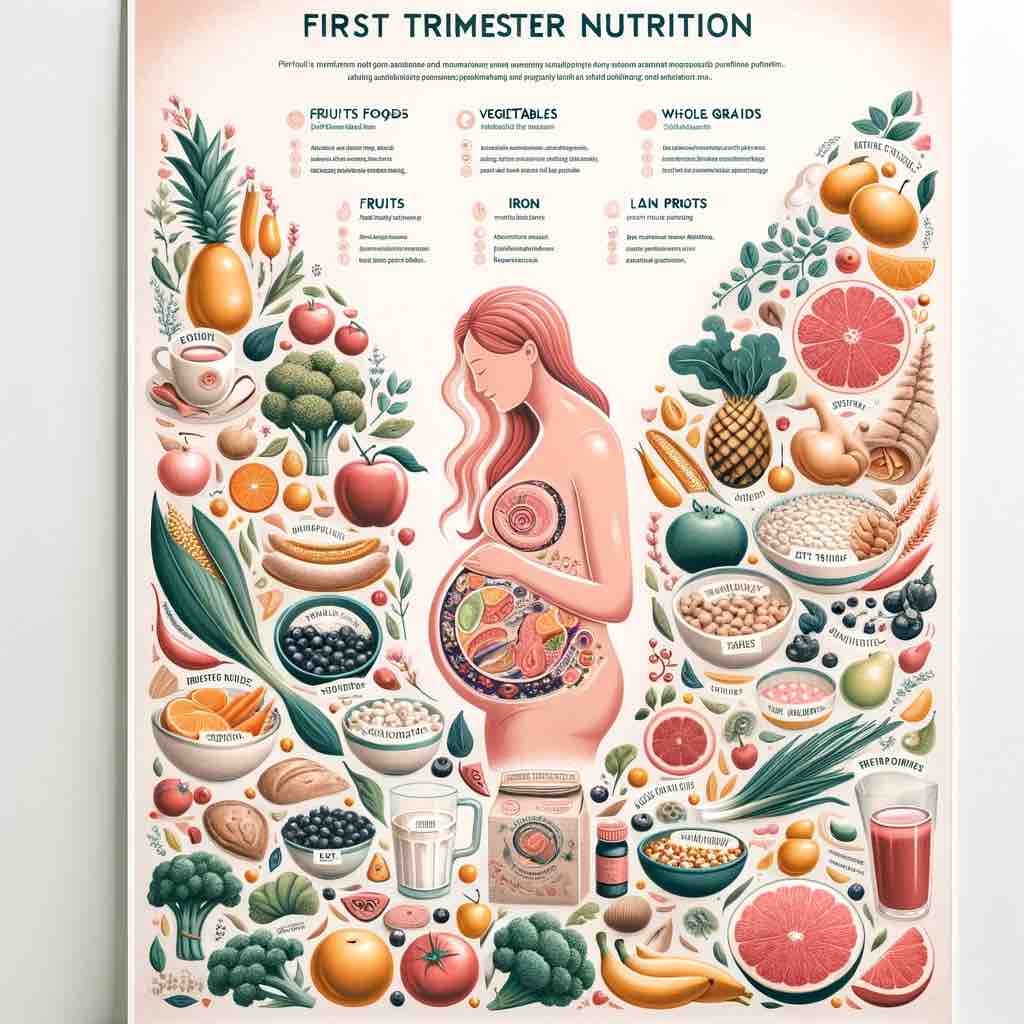
Managing a special condition during pregnancy often necessitates a unique and detailed approach to nutrition. Whether you’re expecting twins, dealing with gestational diabetes, or encountering other specific health considerations, tailoring your diet to meet these unique challenges is crucial. This comprehensive guide delves deeper into the dietary adjustments and considerations for such special pregnancy scenarios.
1. Nutrition for Twin or Multiple Pregnancies:
Carrying twins or multiple babies significantly increases nutritional demands, requiring careful planning and adjustments.
- Substantially Increased Caloric Needs: Expectant mothers of twins or multiples often need an additional 600-800 calories per day, but this can vary. Prioritize calorie quality by choosing nutrient-dense foods that provide essential vitamins, minerals, and antioxidants.
- Elevated Protein Requirements: Aim for 100-150 grams of protein daily to support the growth of multiple fetuses. Diverse protein sources, including lean animal proteins, legumes, tofu, and nuts, are essential.
- Amplified Need for Micronutrients: The requirements for iron, folic acid, calcium, and magnesium are considerably higher. A balanced diet, possibly supplemented with a prenatal vitamin tailored for twin pregnancies, is critical.
- Focus on Hydration: Increased blood volume and amniotic fluid for multiple babies necessitate higher fluid intake. Aim for at least 10-12 glasses of water daily, and more if advised by your healthcare provider.
2. Managing Gestational Diabetes with a Tailored Diet:
Gestational diabetes requires a strategic approach to diet to maintain healthy blood sugar levels.
- Balanced Carbohydrate Intake: Opt for complex carbohydrates that have a low glycemic index and are rich in fiber. These include whole grains, legumes, and non-starchy vegetables, which help moderate blood sugar spikes.
- Meal Planning and Timing: Consistent meal times with balanced macronutrients (carbohydrates, proteins, fats) help stabilize blood sugar levels. Small, frequent meals can be more effective than larger meals.
- Fiber-Rich Foods: Emphasize foods high in fiber, such as whole grains, fruits with the skin on, vegetables, and legumes, to aid in blood sugar management and overall digestive health.
- Monitoring and Adjusting: Regular blood glucose monitoring is key. Work with a healthcare provider or dietitian to adjust your diet based on these readings.
3. Dietary Considerations for Other Special Pregnancy Conditions:
- Hyperemesis Gravidarum: This severe form of morning sickness may require a diet consisting of small, frequent, bland meals and snacks. Focus on foods that are easy to digest and less likely to trigger nausea, like crackers, toast, and broth.
- Preeclampsia: A condition characterized by high blood pressure that may necessitate a low-sodium diet. Rich sources of protein and foods high in antioxidants can be beneficial, but individual dietary recommendations should be discussed with a healthcare provider.
- Special Diets (Vegan, Vegetarian, Gluten-Free): Ensure you are receiving all necessary nutrients, which might be more challenging with dietary restrictions. Supplements might be necessary, especially for nutrients like vitamin B12, iron, DHA, and calcium.
4. Additional Nutritional Tips for Special Pregnancy Conditions:
- Frequent Medical Consultations: Regular check-ins with your healthcare provider are crucial for monitoring the health of both the mother and the baby(s) and making any necessary dietary adjustments.
- Mindful Eating: Pay attention to how your body responds to different foods and adjust your diet accordingly. Mindful eating can help in better understanding your body’s needs and reactions.
- Staying Informed and Flexible: Pregnancy is a dynamic process, and nutritional needs can change. Stay informed with the latest guidelines and research, and be prepared to adapt your diet as your pregnancy progresses.
Navigating the nuances of special pregnancy conditions requires a thoughtful, well-informed approach to nutrition. By understanding the specific dietary needs and making appropriate adjustments, expecting mothers can significantly contribute to a healthier pregnancy outcome for themselves and their babies.
FAQs for Nutrition in Special Pregnancy Conditions
1. Q: How much extra protein do I need in a twin pregnancy?
A: In a twin pregnancy, aim for about 100-150 grams of protein daily. This helps support the growth of multiple fetuses and is higher than the requirement for a singleton pregnancy.
2. Q: What are the best food choices for managing gestational diabetes?
A: Focus on low-glycemic-index foods, such as whole grains, legumes, non-starchy vegetables, and lean proteins. Balanced meals with controlled portions of carbohydrates can help manage blood sugar levels.
3. Q: Can I follow a vegetarian diet during a twin pregnancy?
A: Yes, a vegetarian diet can be suitable during a twin pregnancy, but it’s important to ensure you’re getting enough protein, iron, calcium, and B12. Consider speaking with a dietitian to plan a balanced vegetarian diet.
4. Q: How can I increase my iron intake for a twin pregnancy?
A: Incorporate iron-rich foods like lean red meats, spinach, lentils, and iron-fortified cereals. Pairing these with vitamin C-rich foods can enhance iron absorption.
5. Q: What dietary changes should I make for hyperemesis gravidarum?
A: For hyperemesis gravidarum, eat small, frequent meals consisting of bland, easy-to-digest foods like crackers, toast, and broths. Avoiding strong smells and greasy or spicy foods can also help.
6. Q: Are there specific foods to avoid in gestational diabetes?
A: Avoid foods high in simple sugars and refined carbohydrates, such as sugary beverages, sweets, and white bread. These can cause rapid spikes in blood sugar levels.
7. Q: What is the recommended fluid intake during a twin pregnancy?
A: Aim for at least 10-12 glasses of water daily during a twin pregnancy. Hydration needs are increased due to the higher blood volume and amniotic fluid.
8. Q: How do I ensure I’m getting enough calcium in my diet during pregnancy?
A: Include calcium-rich foods like dairy products, fortified plant-based milks, leafy greens, and almonds. If you’re lactose intolerant, focus on lactose-free dairy or calcium-fortified alternatives.
9. Q: Should I take any supplements for gestational diabetes?
A: While diet is key in managing gestational diabetes, supplements like chromium or magnesium may be beneficial but should only be taken after consulting with a healthcare provider.
10. Q: How can I safely consume fish during pregnancy to avoid mercury?
A: Opt for low-mercury fish like salmon, trout, and sardines, and limit your consumption of higher mercury fish like tuna. Fully cooked, these fish are safe and beneficial for pregnancy.
Blog Tags for the Post
twin pregnancy nutrition, gestational diabetes diet, special pregnancy diets, hyperemesis gravidarum, pregnancy iron intake, managing diabetes during pregnancy, high-risk pregnancy diet, vegetarian pregnancy, prenatal hydration, pregnancy calcium sources












